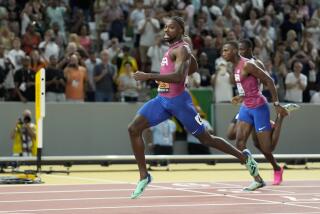Edwards Gets Back on Track
- Share via
The wait to get back on the track seemed endless.
Sure, Torri Edwards found ways to stay busy while she served a doping suspension for accidentally taking a banned stimulant. She went back to school to finish her degree. She kept going to practice to stay in shape. She went shopping with her mother and spent time with her brother.
But nothing filled that void of competition. While her training partners were off in Europe, Edwards would sit alone in her Los Angeles apartment, angry and frustrated, wondering when her luck would turn.
It finally did in November. Edwards was reinstated by track and field’s world governing body after serving 15 months of a two-year ban when the stimulant she tested positive for, nikethamide, was downgraded into a category that carries a maximum punishment of one year.
Edwards immediately phoned her mother, LaNecia, who was visiting relatives in Jamaica.
“When I found out, everybody on the island must have heard me,” LaNecia Edwards said.
Now the 29-year-old Edwards wants everyone to take notice she’s back. She has rededicated herself to track, running in meets nearly every week to get herself back in rhythm and the swing of competition. She also will run in the 100 and 200 meters at the U.S. track and field championships starting June 21 in Indianapolis.
The focus, however, is hardly on results in 2006. After being robbed of her chance to compete in Athens, her biggest goal is winning medals at the world championships next year and the 2008 Olympics in Beijing.
“I missed out on the Olympics, I thought that was my biggest opportunity because I was mature and I was in great shape and I was experienced,” said Edwards, the 2003 world champ in the 100. “After a while, I accepted this is how it’s going to be and I had to focus and show the world I am one of the best sprinters.”
Or as her coach, John Smith said, “This whole season is going to be getting Torri back to racing. Next year, they’re going to have somebody to deal with.”
Edwards’ world came crashing down during the U.S. Olympic trials in July 2004 when it was revealed she tested positive for nikethamide at a meet in Martinique. She blamed the result on two glucose tablets she took because she was feeling ill, given to her by her team’s physical therapist. Edwards said she was unaware they contained any banned substances.
Making matters much worse was the time at which the positive test was revealed. It was at the height of the BALCO doping scandal in which Marion Jones and Tim Montgomery were targeted.
“Any time somebody hears you have a two-year ban, they automatically associate it with something harsh,” said hurdler Allen Johnson, Edwards’ boyfriend. “But it was something so minor, the penalty was harsh. She just felt like she got such a hard sentence because she made this mistake.”
Edwards fought her penalty, and was given hope that it might be overturned. But her hope was for naught.
Days before she would have run in the Olympics, the international Court of Arbitration for Sport rejected her appeal. Though the panel ruled she wasn’t a cheater, it said she should have been aware of what she was taking.
“I didn’t realize the system they have set up going to all the different hearings, it was a waste of time,” she said. “I could have accepted my penalty and lived with it. I had all this hope. I even had people in the hearings agreeing with me. It still didn’t matter.”
Edwards watched some of the competition in Athens, but it was too much. When she returned home, her mother urged her to enroll at Southern California again to finish her degree in sociology. Smith urged her to keep training.
She did both.
“I would sit with her in her darkest days and say, ‘I believe in you,’ ” Smith said. “Someone had to sit there and keep the light on. It was overcast, there was a little snow, people kept throwing snowballs in her face. I said that is unacceptable.”
There were days when Edwards skipped practice because it was too difficult. She would phone her mom and cry. Or scream. Or say nothing at all.
“Some days it was really hard,” Edwards said. “I was training, training, training, with no reward in sight.”
She graduated in December 2004 with her degree. But that left 19 months more to go until her suspension was to be done. On top of it all, she lost her endorsement with Adidas and had no income.
“She was depressed,” Johnson said. “She felt she lost her whole career.”
Edwards refused to give up. She was on the phone with the IAAF and World Anti-Doping Agency asking if she had any hope of her penalty being cut down. She even called WADA chief Dick Pound to express her disappointment in the hearing process.
When she finally was eligible to return, Edwards worked harder than ever. She got an endorsement deal with Nike in January, and ran in her first race Feb. 18 at an indoor meet in Birmingham, England, where she overcame nerves to finish fourth in a 60-meter race.
At the Reebok Grand Prix in New York last weekend, she finished third in the 100 behind Marion Jones and Veronica Campbell.
Though she believes what she went through is unfair, Edwards has accepted it. Now she just wants to win again.
“This whole year, I really trained hard, and I focused on coming back and making sure that I look good when I come back,” she said.
More to Read
Go beyond the scoreboard
Get the latest on L.A.'s teams in the daily Sports Report newsletter.
You may occasionally receive promotional content from the Los Angeles Times.






